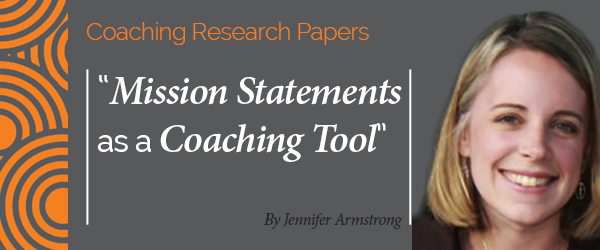Research Paper By Jennifer Armstrong
(Strategic Planning Coach, UNITED STATES)
Introduction
How coaches can use mission statements as a powerful exercise to help clients move forward?
Professional coaches work with clients to help them achieve their goals and fulfill their potential. Often, this process involves increasing self-awareness and clarifying their purpose, in order to design and create action. Coaches use a wide variety of tools to support clients, ranging from the basic, yet powerful tools of listening and questioning, to reframing perspectives through the evaluation of values, beliefs, and commitments, and a range of assessments and exercises. Developing a mission statement is an exercise that can be an effective coaching tool to create awareness, clarity, commitment and action.
What is a Mission Statement?
According to John A. Pearce and Fred David, a mission statement is an “enduring statement of purpose that reveals an organization’s product or service, markets, customers and philosophy… [It] provides the foundation for priorities, strategies, plans and work assignments.” (1987) Mission statements vary in length from a few words to a few paragraphs and there is no clear agreement about what specific components must be included. However, components can include a description of purpose, products, stakeholders, values, revenue and more.
While mission statements originated as a management tool for organizations, and are today are widely used in corporate identity creation, the principal can be applied to individuals, as well. It is helpful to look at how mission statements are used in organizations to learn what attributes may be most effective in coaching.
A Review of Mission Statement Research
There is no agreed upon formula for exactly what components should be included in a mission statement. It appears to be generally agreed upon that mission statements should be put into writing, and according to Bart & Tabone, that they are created by stakeholders to improve performance (Smith et al, 2001).
Researchers have studied key components of mission statements to determine what content is most effective. According to Andrew Campbell, who developed the Ashridge Mission Model, mission statements should include purpose, strategy, values, behavioral standards and descriptors of the organization’s culture. (Smith et al, 2001). In a study of Fortune 500 firms, Pearce and David identified traits common to the mission statements of the higher performing companies when compared to the lower performers. These higher performers’ mission statements shared philosophical information including the organizations’ basic beliefs, values, aspirations and priorities. They also addressed their self-concept, including competitive strengths, and desired public image.
The researchers recommended other firms consider the following elements when developing their own mission statements:
- Specification of target customers and market
- Identification of principal products and services
- Specification of geographic domains
- Identification of core technologies
- Commitment to survival, profitability and growth (1987)
Bart and Baetz reported that while the presence of financial goals in a mission statement was negatively correlated with firm performance, statement of purpose and specific values was positively related to performance and the identification of the business strategy made no difference. (Smith et al, 2001)
Another study found that identity and social responsibility were key elements in mission statements of top U.S. companies. The study was designed to test Arei de Geus’ theory that the four characteristics shared by these “living companies,” or companies committed to longevity and contribution rather than mere profitability, are sensitivity, identity, tolerance and conservative financing. Researchers determined that of the four characteristics, only identity was common to the mission statements of living companies. This attribute of “identity,” was defined by de Geus as “a cohesive set of values shared by organizational members that makes them a community in pursuit of survival. In fact, living companies adopt longevity as a purpose. As such, workers value themselves as stewards of a societally beneficial enterprise.” This study also showed that mission statement references to social responsibility are “intricately related to company survival.” (Smith et al, 2001)
